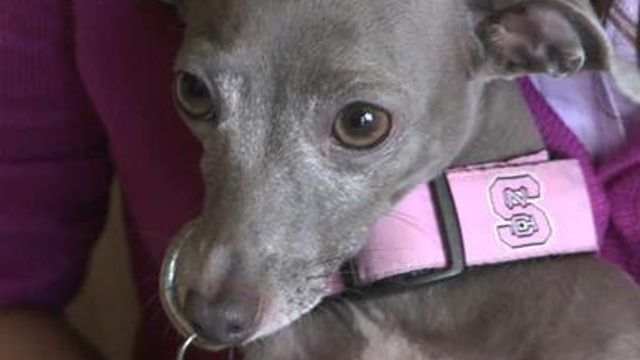Humane Society pushes for animal welfare regulation
Animal welfare activists and some North Carolina lawmakers are pushing for stronger penalties for animal abuse and more regulation of commercial breeders, in an effort to combat abuse cases and inhumane conditions at puppy mills across the state.
Posted — UpdatedAlthough 70 percent of the state’s households have at least one dog or cat as a pet – higher than the national average of 63 percent – advocates allege that North Carolina has some of the weakest animal welfare laws in the nation.
The Humane Society’s state director Kim Alboum said the lack of oversight is “ridiculous.” She says powerful interest groups have a hand in keeping animal welfare laws off the books.
“We have unbelievable support from the general public (but) we are working against the American Kennel Club, the National Rifle Association, the Pork Council and the Farm Bureau,” Alboum said.
Nineteen states currently register or regulate commercial breeders.
The American Kennel Club, among other groups who profit from commercial breeders, was outspoken against it. The bill didn’t pass.
In an April email, an AKC spokeswoman said the bill would have “created numerous, confusing and costly burdens for (counties), taxpayers and responsible breeders, without actually protecting the health and welfare of dogs.”
Hunting and agricultural groups say the Humane Society's true goal is to outlaw hunting and farming. They've told lawmakers cracking down on puppy mills could be the first step toward that.
For Alboum, the issue is simple.
“Thousands of animals are suffering in North Carolina in puppy mills,” she said. “We just want them to have minimum standards. I can’t imagine why anybody wouldn’t want that.”
Laura Patterson learned the dangers of puppy mills first-hand when she bought an Italian Greyhound puppy that has needed about $10,000 worth of veterinary care because of conditions at a Greensboro-area breeding operation.
The dog has had two broken legs, a deformed tail and foot, liver and blood problems, bad teeth, allergies and acid reflux.
Patterson said she did all the research she could before she bought her puppy, Olive, and had no idea that the breeder was running a puppy mill.
But when the puppy mill got busted by the Guilford County Sheriff’s Office, Patterson was horrified by what she saw on the news.
“(The dogs) had been bred so much their insides were hanging out. Their dewclaws had grown where they were wrapped around. They were just emaciated,” Patterson said. “Some of the puppies were being eaten by rats, lying in their own feces.”
The breeder pleaded guilty to animal cruelty.
Alboum said the conditions Patterson described are common in puppy mill operations and they are exactly the reason she wants regulation. But S.B. 460 failed in 2010, and Alboum said she was told not to bother filing a similar bill this year.
In 2010, animal welfare advocates had some success in strengthening animal cruelty penalties.
Sen. Don Vaughan, D-Guilford County, authored the bill despite an unspoken rule he’s perceived in the General Assembly.
“One of the things you learn when you come (here), and this is my second term, is you don’t run any bills with regard to animals,” he said.
Still, he said, animal abuse needed to be addressed.
“I believe people who are involved with animals are just very fearful of change. I don’t know. It seems to me (to be) logical and good to punish those that abuse animals,” Vaughan said.
This year, Vaughan is sponsoring a bill that addresses animal neglect called Chamberlin’s Law, which was named for a dog that was tied up for months by its High Point owners without food or water. But legislative leaders have put it on hold.
"I was asked to pull it back because of all the attention it was getting in the committee," said Senate Rules chairman Tom Apodaca. "Most people favored it, but there were some groups who were scared it might go too far and affect their ability to do legitimate business."
The AKC does not support Chamberlin’s Law, calling it “too vague.” The organization did stress, however, that it takes a “strong line on animal cruelty” and has its own inspections program for breeders who register their litters under the AKC name.
WRAL requested interviews with the National Rifle Association, the NC Pork Council and the NC Farm Bureau, but all three groups declined to comment.
• Credits
Copyright 2024 by Capitol Broadcasting Company. All rights reserved. This material may not be published, broadcast, rewritten or redistributed.





